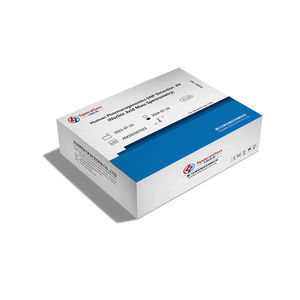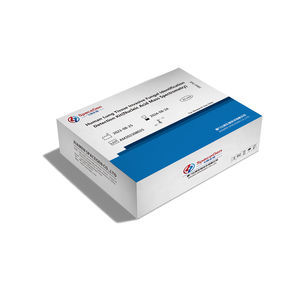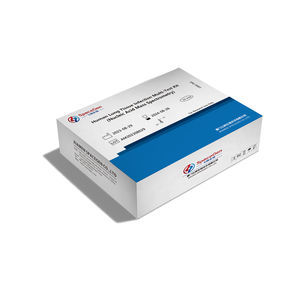

- Company
- Products
- Catalogs
- News & Trends
- Exhibitions
Research detection kit AMP202307019tuberculosisMycobacterium tuberculosisclinical
Add to favorites
Compare this product
Characteristics
- Applications
- for research, tuberculosis
- Micro-organism
- Mycobacterium tuberculosis
- Sample type
- clinical, biological
- Analysis mode
- molecular, nucleic acid mass spectrometry
Description
Tuberculosis, caused by Mycobacterium tuberculosis infection, is one of the significant communicable diseases that pose a serious threat to human health. Drug-resistant mutations in Mycobacterium tuberculosis can develop resistance against anti-tuberculosis drugs. Drug-resistant tuberculosis has always been a focal and challenging aspect in tuberculosis prevention and control efforts. It not only requires prolonged and costly treatment but also has a low cure rate, posing a severe threat to the health of society and the general population. Therefore, accurate detection of drug-resistant mutations against anti-tuberculosis drugs is crucial for the diagnosis and treatment of tuberculosis.
DETECTION METHOD
Matrix-Assisted Laser Desorption/Ionization Time-of-Flight Mass Spectrometry (MALDI-TOF-MS) is a novel technique used for the analysis of biological molecules. It involves the formation of a thin co-crystallized film by irradiating the sample with a laser in the presence of a matrix. The matrix absorbs energy from the laser and transfers it to the biological molecules, causing their ionization. The ionized molecules are then accelerated through a flight tube by an electric field, and their time of flight to the detector is used to accurately determine their molecular weight, allowing for precise identification and separation of biomolecules.
DETECTION SIGNIFICANCE
Accurate identification of common drug-resistant gene mutation sites in clinically prevalent Mycobacterium tuberculosis strains, covering six anti-tuberculosis drugs (Rifampin, Ethambutol, Fluoroquinolones, Isoniazid, Streptomycin, and Pyrazinamide), can assist in the clinical treatment of tuberculosis.
Catalogs
No catalogs are available for this product.
See all of SPACEGEN‘s catalogsRelated Searches
- Assay kit
- Blood assay kit
- Immunoassay assay kit
- Plasma assay kit
- Infectious disease detection kit
- Analysis medical software
- Molecular test kit
- Whole blood detection kit
- Respiratory infection test kit
- Clinical assay kit
- Optical assay kit
- Fluorescence assay kit
- Viewer software
- Real-time PCR test kit
- Research assay kit
- Laboratory software
- Windows medical software
- Oncology test kit
- Laboratory detection kit
- Cell assay kit
*Prices are pre-tax. They exclude delivery charges and customs duties and do not include additional charges for installation or activation options. Prices are indicative only and may vary by country, with changes to the cost of raw materials and exchange rates.




